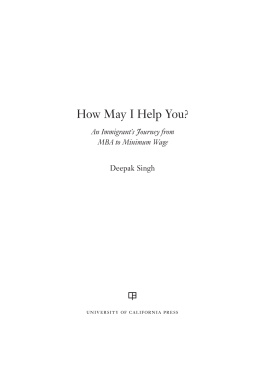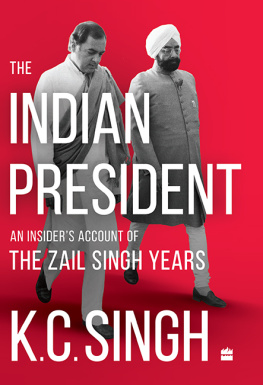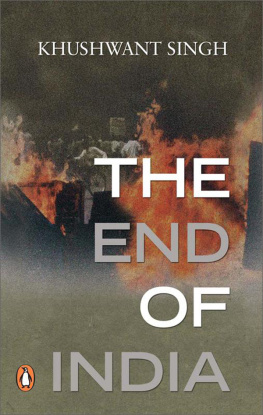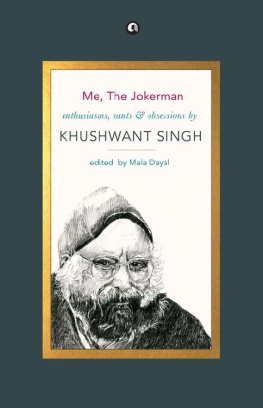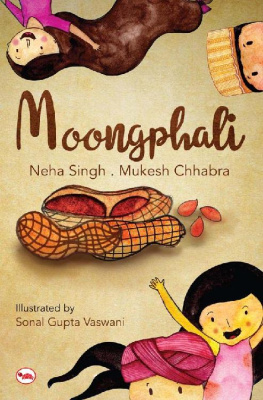FOREWORD
HOLLY DONAHUE SINGH
How May I Help You? takes on the issues of the working poor, immigration, and diversity in the United States through an intimate portrait of people living these realities, including the author himself. The story is not one of dire poverty or of illegal migration. Instead, it is an account about people living at the edge of hope and at the edge of making it, piecing together their lives around work, family, and other responsibilities, while finding ways to enjoy life. Its about a daily grind thats familiar to many people in the United States, yet the daily realities of which rarely capture national attention beyond debates about wages. As a new adult immigrant to the United States, Deepak Singh paid closer attention to his colleagues, his customers, and his environment than a native-born worker, someone who might learn the ropes and take the rest of the job for granted, would have. That perspective, along with his attention to storytelling, developed through writing for radio and other popular media, makes this a book that is deeply ethnographic and poignant, yet, at moments, also funny and lighthearted.
The United States that many Indians of Deepaks generation knew was America or even Amrika, a dreamland that, in contrast to India, was filled with rich people, clean air and water, and an unlimited supply of electricity. What Deepak found was something else. This combination of perspectives makes the book well suited to foster thoughtful discussion about how life looks to people engaged in service work and about the possibilities for structural and cultural transformation in the United States.
While every persons experiences are necessarily idiosyncratic, to a certain degree, Deepaks story highlights themes studied and debated by scholars and activists. For instance, Deepaks downward mobility in the workplace after his arrival underlines the difficulties many immigrants experience in finding a niche in a highly differentiated economy stratified between low-paid service work and highly compensated tech skills. Deepak was someone who didnt fit into either category easily. He had a masters degree in business, fluency in English, and legal permission to work. From India, he brought experience working for the British Broadcasting Corporation as a radio producer, as well as a long history of working with scholars from American and British universities and international professionals from organizations such as the World Health Organization and UNICEF. Still, after months of searching, he could land only a low-wage position. Other professionally trained immigrants, especially those with limited English skills, also find themselves faced with few options. Doctors become nurses aides, lawyers become office workers, and teachers become tutors in an economic environment that is based on narrow credentials and is unforgiving of training outside the United States.
In a related vein, we glean from Deepaks observation the complex work life of his low-paid colleagues, struggling to make it as single mothers and minority employees and given little control over their work environments. Deepaks evolving relationship with the fellow employee he calls Ron, a middle-aged African American man trying to keep his job, his house, his health, and his current wife, is an especially moving example of how the conditions of work and social position affect workers life trajectories. Workers in these low-prestige positions have few options when children get sick or transportation falls through. Both Ron and Jackie struggled to complete the managers training program, which compelled them to take on extra responsibilities at the store and to drive themselves to meetings in a nearby town. Broken-down cars, sick children, and a lack of backup options for dealing with the inevitable ups and downs of daily life presented major barriers to the relative security of job and salary promised by a promotion to management. Unprotected by unions and often accruing little vacation or sick time, these service workers are on the front lines, and they are thrown away when they cant fulfill the exacting regulations around their positions.
Deepak also underscores how overt racism and a more subtle sense of unfamiliarity colors the work environment for immigrants. His otherness as a nonwhite employee possessing an ethnicity not clearly understood by most of his customers or colleagues led to confusion about his ethnicity and race. His customers didnt understand how he spoke or how to categorize him. However, his otherness and ambiguous identity also afforded him an opportunity to ask questions, to joke, and to makes mistakes that colleagues and customers might not have otherwise tolerated. Over time, Deepak and his colleagues learned from each other, smoothed the friction that emerged at times, and laughed together. Deepaks experiences, refracted through the lens of his knowledge of privilege and oppression, stemming from his upbringing in India, compel us to come to terms with our racial and ethnic insensitivity and ignorance in this storied land of diversity that is the contemporary United States.
As an anthropologist who was in training to conduct long-term ethnographic fieldwork in India during the time chronicled here, I am struck by how Deepaks particular social position in India and his disposition toward life help him draw readers along with him into his world of work as an outsider-insider in a low-wage position. Although the job had trappings of respectability, exemplified by the dress shirt and pants he ironed to wear to work each day and the lure of being promoted into management, it also came with no easy escape into middle-class life in the United States or back to the world of relative privilege he had come from in India. As the authors significant other and partner in his journey to the United States, I am the one, in some sense, who both enabled his journey and prevented his escape back to the comforts of his old life in India. I read this story with both pride and pain.

